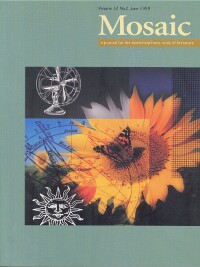Issue 32.2
Overview

General Issue
Published: June 1999
View the issue introduction or see the issue summary and contents below.
10 essays, totalling 192 pages
$15.00 CAD
The ten essays in this general issue of Mosaic centre on four main themes: narrative and the other; literary anticipation of scientific and medical concepts; anthropological representations and cultural observations; and reading and interdisciplinary theory. It engages with various forms of media and genres, including early modern drama, contemporary novels, modern poetry, essays, autobiographies, films, and emblems, all suitable for a range of interdisciplinary approaches.
Stage-Managing “Otherness”: The Function of Narrative in OthelloThorell Porter Tsomondo Among Shakespeare’s plays, Othello is distinct for featuring a Moor as hero and narrative as a major dramatic exponent. Focusing on narration as a “distancing” device, this essay explores the racial discourse in Othello and the way this discourse comments on the power politics of the text and of Shakespeare criticism. | |
Who’s The Boss? McTeague, Naturalism, and Obsessive-Compulsive DisorderKaren F. Jacobson As a 19th-century Naturalist, Frank Norris believed that the lives of humans were determined by heredity, environment, and the pressure of circumstances. Focusing on the issue of control in human behavior, this essay argues that in McTeague he anticipated much of the current theorizing about the condition known as Obsessive-Compulsive Disorder. | |
The Case of the Falling Man: Bergson and Chaos TheoryJure Gantar Conceived as a reaction to 19th-century scientific methods, Bergson’s Le Rire (1900) gained a new significance when these same methods were questioned by later scientists. Focusing on how Bergson anticipated some of the ideas of chaos theory, this essay draws parallels between his theory of laughter and the discourse of non-linear dynamics. | |
The Resistance of American Indian Autobiographies to Ethnographic ColonizationSusan B. Brill de Ramírez Son of Old Man Hat: A Navaho Autobiography, edited by Walter Dyk and based on the stories of his informant Left Handed, has long been regarded as a classic example of Native American autobiography. Employing a “conversive” approach, this essay demonstrates that Left Handed’s stories present a strong exposé of ethnographic methods. | |
Not What We Read but How: Where T.S. Eliot Meets Clifford GeertzInger Sigrun Brodey Recent anthropologists have emphasized the insider/outside dilemma that characterizes attempts to understand other cultures. Focusing on the philosophy of “education” that informs both the prose and poetry of T.S. Eliot, this essay explores his contribution to current debates about the place of multiculturalism in education. | |
Schrödinger’s Cat and Sarah’s Child: John Fowles’s “Quantum Narrative”C. Jason Smith Focusing on Fowles’s references to post-nuclear physics, this essay argues that the multiple endings of The French Lieutenant’s Woman represent not so much a critique of conventional narrative technique as an attempt to free narrative from traditional approaches to the “body” as a single space-time event, and to free women from the discourse of Victorian science. | |
Incorporating Images in Film: Truffaut and Emblems of DeathAlan K. Smith Within cinema, the incorporation of images borrowed from other media reflects the dynamic nexus of eros and thanatos. Using a 16th-century emblem as a crucial reference, this essay explores graphic and verbal configurations of death and desire in François Truffaut’s Le Dernier Métro. | |
Literary Studies and Cognitive Science: Toward a New InterdisciplinarityMary Thomas Crane and Alan Richardson The cognitive sciences offer new paradigms for rethinking the relations among culture, linguistic activity, and agency. This essay provides an overview of the “cognitive revolution” and recent work on the brain, and then discusses the dominant strains within cognitive linguistics, arguing for wider applicability to literary theory and criticism. | |
Plato in Hollywood: David Mamet and the Power of IllusionsHoward Pearce Mamet’s House of Games and Speed-the-Plow explore ideas of worlds and identities, especially the idea of the artist. Focusing on the two female characters in these works, who manifest certain attributes of the artists, this essay explores how identity can be transformed and the way such change is discovered through experiencing an alien world. | |
Trivializing or Liberating? The Limitations of Hypertext TheorizingDavid S. Miall Claims about the virtues of hypertext emphasize how it will free both the reader and the text. Exploring the arguments of theorists such as Jay David Bolter, George Landow, and Stuart Moulthrop, this essay shows that they misrepresent what is actually involved in the reading of both printed and electronic texts. |